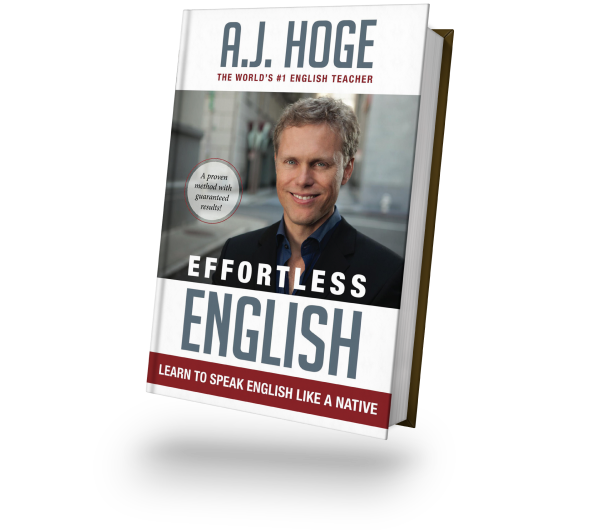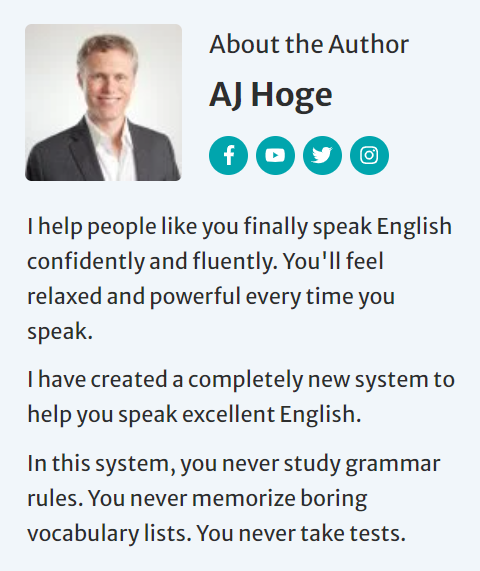Did you know, using physical movement is the fastest and most powerful way to learn English vocabulary?
Dr. James Asher is the pioneer of a method called “Total Physical Response” which uses physical movement to teach vocabulary quickly and long term.
In his research, Dr. Asher found that students learn vocabulary 4-5 times faster when they learn it with physical movement. But he also found something much more important – they remember it long term!
Students who study vocabulary using normal memorization techniques usually forget most of what they studied. After one year, normal students using normal methods will forget 80% or more of what they “memorized” the previous year. Students who learn the vocabulary with actions will REMEMBER 80% of what they learned – one year earlier!
That’s a HUGE difference.
Dr. Asher also found other benefits to learning in this way. The main additional benefit is that learning with movements is more fun.
Why is that important?
Because when students enjoy their learning, they continue to do it. They don’t quit as often. Since language mastery is a long-term process, avoiding quitting is, in fact, a VERY important goal.
Dr. Asher found that “Action Classes” have retention rates 30-80% higher than traditional English classes. In other words, students in the “Action Classes” are more likely to continue studying English year after year after year. This creates MUCH HIGHER long-term success rates.
This research has been confirmed by other researchers, which means there simply is no argument. Learning with actions is far superior to learning in a traditional English class, or learning independently with traditional methods.
It is, therefore, vital that you use PHYSICAL ACTION whenever you learn English!
Exploring the Relationship Between Vocabulary and Movement
So many students waste time trying to memorize English vocabulary. They study long lists of vocabulary and repeat the lists many times, trying to memorize the English words and their translated meanings.
And with the above research demonstrating that 80% of this vocabulary will be forgotten in less than a year – that’s a lot of wasted time and effort.
As mentioned previously, there’s another problem with this vocabulary learning method – it’s boring and therefore it kills long-term motivation. Students must be very careful because killing your motivation is the worst thing you can do. Learning English is a marathon, it requires high levels of motivation that are sustained for many years.
Using boring vocabulary learning methods, therefore, is doubly bad: it is inefficient and it weakens motivation.
Thankfully, we know that there is a better way – as participants in my recent Breakthrough Seminar in Bangkok learned.
The key to deep, powerful, long-term vocabulary learning is movement. When we combine strong physical movements with understandable new vocabulary, we create deep connections in our brains and bodies. These connections are long term – they last!
In the seminar, I taught a number of new words using strong actions. The students shouted the new words with me while simultaneously using the strong actions I showed them. By the end of the lesson, they knew those words well.
But that’s not all. Since Effortless English is a deep learning system, I repeated those new words again – this time in a Mini-Story. Each time I used one of the new words in the story, I used the same physical movement we had been practicing. Through the Mini-Story, the students got even more repetition of the vocabulary, with emotion and strong movements.
Finally, I gave the students homework: download the audio of the same Mini-Story lesson and listen to that audio every day for one week.
If the students do this, they will learn these new vocabulary words very deeply and will remember them forever. That is the power of the Effortless English System, and that is the power of using physical movement while learning!
Vocabulary: Faster, Longer, Passive, Active
Want to know more about how you learn vocabulary faster and remember it longer? Want to understand the difference between active vocabulary and passive vocabulary and why it’s important? Want to learn why emotions and context are vital for learning vocabulary?
AJ answers these questions and more in this episode of The Effortless English Show.





